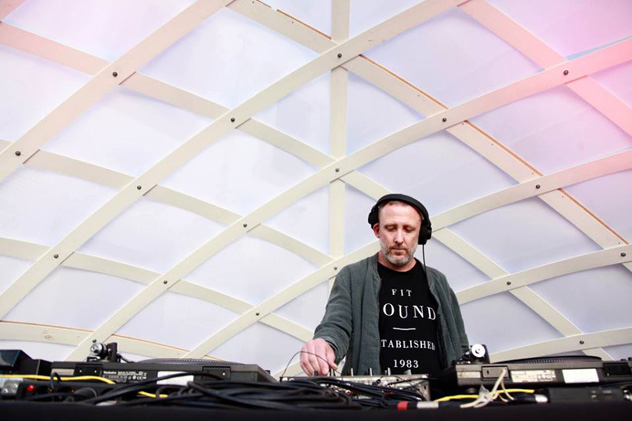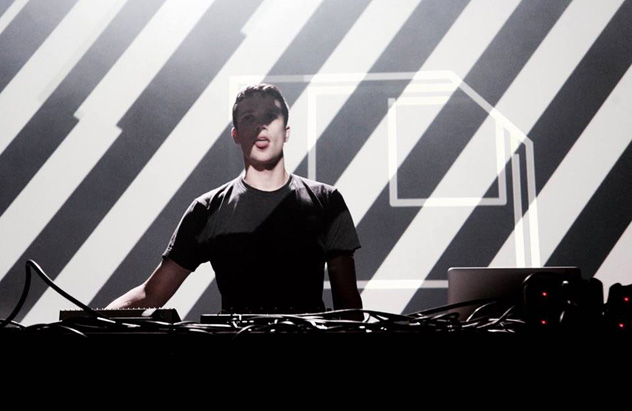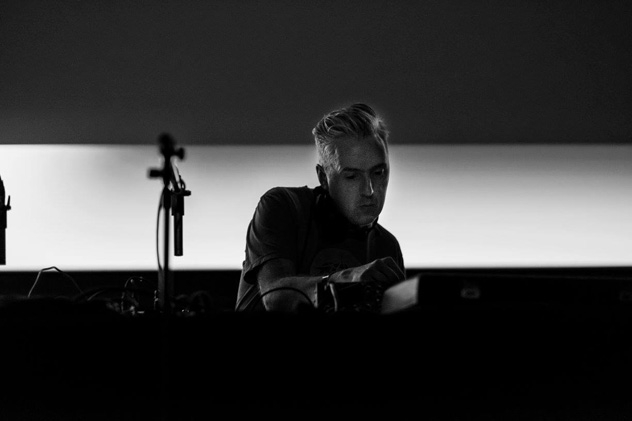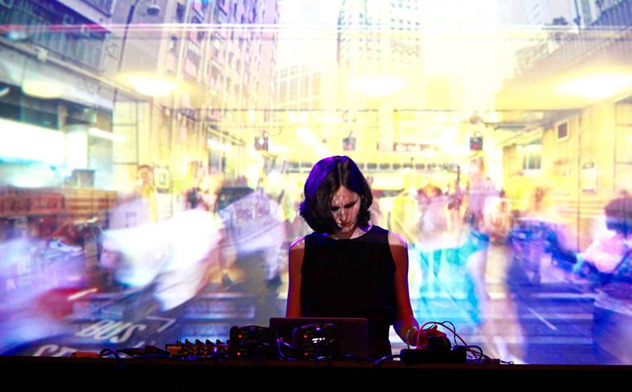- There's no shortage of electronic music in Barcelona. Between festivals like Sónar, event series like Piknic Électronik and the weekly programming at clubs like Nitsa, Razzmatazz and Moog, plenty of high-quality electronic acts come through town. That said, one doesn't have to look too closely to see the bulk of those events skew toward house and techno. The Lapsus crew, who are mostly known here for their weekly show on Spain's Radio 3, do like house and techno, but they also have a passion for more experimental and hard-to-define sounds that linger on the fringe of the dance floor. They've been staging events since 2004 and also run a small record label. In 2014, they launched a boutique festival, bringing artists like Fennesz and Kangding Ray to the Catalan capital. The 2015 edition capitalized on that momentum, showcasing the likes of Kyle Hall, Mouse On Mars and Patricia and ultimately selling out.
2016 saw the festival expand even further. Once again staged at the Centre De Cultura Contemporània De Barcelona (better known as CCCB), the festival featured nearly 20 acts spread over three areas during the course of a single day and night.
As a venue, it's hard to find fault with the CCCB, which is located in the heart of Barcelona's El Raval neighborhood. The festival's opening hours took place in the venue's central plaza, a gorgeous square surrounded by mirrored windows that catch the reflection of the city's skyline and the Mediterranean. Festival attendees were slow to arrive, but those who came early were treated to a sunny afternoon soundtracked by Soul Jazz Records Sound System and noted journalist (and former RA contributor) Philip Sherburne.
 The majority of the festival took place inside the CCCB, where two areas (dubbed "Hall" and "Teatre") hosted performances from the late afternoon onward. Although organizers did their best to enhance the atmosphere with visuals, both indoor areas were functional at best, at least from an aesthetic perspective. The sound, though, was solid throughout the evening. In terms of music, the lineup was rather varied, with the schedule arranged so that the tempos could pick up with each passing hour. Powell and Ceephax Acid Crew delivered standout performances in the Hall. The former impressed with his industrial-flavored live show, while the latter received what was perhaps the most enthusiastic response of the night with his willfully goofy and playfully loose live set of video game-referencing acid jams.
The majority of the festival took place inside the CCCB, where two areas (dubbed "Hall" and "Teatre") hosted performances from the late afternoon onward. Although organizers did their best to enhance the atmosphere with visuals, both indoor areas were functional at best, at least from an aesthetic perspective. The sound, though, was solid throughout the evening. In terms of music, the lineup was rather varied, with the schedule arranged so that the tempos could pick up with each passing hour. Powell and Ceephax Acid Crew delivered standout performances in the Hall. The former impressed with his industrial-flavored live show, while the latter received what was perhaps the most enthusiastic response of the night with his willfully goofy and playfully loose live set of video game-referencing acid jams.
 Things got a bit rowdy in the Teatre for Jlin, who closed out the festival with a relentless assault of high-velocity rhythms. There had been lots of anticipation for Lotic and M.E.S.H., but it felt like the crowd wasn't quite ready for their uniquely twisted low-end mutations, which brought together hip-hop, various strains of bass music and the sort of widescreen sound design one usually finds in a big-budget Hollywood film. Some of that dissonance might come from the fact that hip-hop isn't nearly as ingrained in the music culture here as it is in the US, where both M.E.S.H. and Lotic are from. Without those references, some folks on the floor seemed a bit confused.
It didn't help that Lapsus's overall attendance felt a bit light. This year's turnout was certainly respectable, and it was nice to have room to maneuver. But in terms of the overall vibe, the festival never felt close to a boiling point.
Things got a bit rowdy in the Teatre for Jlin, who closed out the festival with a relentless assault of high-velocity rhythms. There had been lots of anticipation for Lotic and M.E.S.H., but it felt like the crowd wasn't quite ready for their uniquely twisted low-end mutations, which brought together hip-hop, various strains of bass music and the sort of widescreen sound design one usually finds in a big-budget Hollywood film. Some of that dissonance might come from the fact that hip-hop isn't nearly as ingrained in the music culture here as it is in the US, where both M.E.S.H. and Lotic are from. Without those references, some folks on the floor seemed a bit confused.
It didn't help that Lapsus's overall attendance felt a bit light. This year's turnout was certainly respectable, and it was nice to have room to maneuver. But in terms of the overall vibe, the festival never felt close to a boiling point.
 Still, some of the festival's performances undoubtedly benefitted from the relatively relaxed atmosphere. Donnacha Costello treated an almost silent Teatre to a chilly set of extended synth tones, while UK act HKE offered up a darkly hypnotic audio-visual session inspired by a late-night train ride through an anonymous urban landscape. Opening the room was Seville-based artist Cordero, whose pensive creations brought to mind the Balearic ambience of artists like Gigi Masin.
Cordero wasn't the only Spaniard who refused to be overshadowed by the festival's international guests. Last-minute addition Lanoche, who filled in when a family emergency forced Karen Gwyer to cancel, played a quality live session of nuanced techno. Even better was LCC (short for LasCasiCasiotone), a female duo from the Asturias region. The Editions Mego-affiliated pair would have benefited from some kind of visual element, but their live set was thrillingly good, a slow-burning dirge of abstract and bass-loaded techno that wouldn't be out of place in the Modern Love roster.
Still, some of the festival's performances undoubtedly benefitted from the relatively relaxed atmosphere. Donnacha Costello treated an almost silent Teatre to a chilly set of extended synth tones, while UK act HKE offered up a darkly hypnotic audio-visual session inspired by a late-night train ride through an anonymous urban landscape. Opening the room was Seville-based artist Cordero, whose pensive creations brought to mind the Balearic ambience of artists like Gigi Masin.
Cordero wasn't the only Spaniard who refused to be overshadowed by the festival's international guests. Last-minute addition Lanoche, who filled in when a family emergency forced Karen Gwyer to cancel, played a quality live session of nuanced techno. Even better was LCC (short for LasCasiCasiotone), a female duo from the Asturias region. The Editions Mego-affiliated pair would have benefited from some kind of visual element, but their live set was thrillingly good, a slow-burning dirge of abstract and bass-loaded techno that wouldn't be out of place in the Modern Love roster.
 That a relatively obscure act from the North of Spain can wind up as the festival's top performance speaks to why Lapsus is such an interesting event. It's not a festival for everyone, nor is it meant to be. The crowd was knowledgeable, enthusiastic and respectful, but the festival never felt boring or academic. It may have been a bit subdued, but it was also a lot of fun. And it was a rare chance to see a lot of leftfield music that doesn't really fit anywhere else in this city. People may not have been dancing en masse, but they were definitely smiling, and that felt like more than enough.
Photo credit /
Judit Contreras
That a relatively obscure act from the North of Spain can wind up as the festival's top performance speaks to why Lapsus is such an interesting event. It's not a festival for everyone, nor is it meant to be. The crowd was knowledgeable, enthusiastic and respectful, but the festival never felt boring or academic. It may have been a bit subdued, but it was also a lot of fun. And it was a rare chance to see a lot of leftfield music that doesn't really fit anywhere else in this city. People may not have been dancing en masse, but they were definitely smiling, and that felt like more than enough.
Photo credit /
Judit Contreras
 The majority of the festival took place inside the CCCB, where two areas (dubbed "Hall" and "Teatre") hosted performances from the late afternoon onward. Although organizers did their best to enhance the atmosphere with visuals, both indoor areas were functional at best, at least from an aesthetic perspective. The sound, though, was solid throughout the evening. In terms of music, the lineup was rather varied, with the schedule arranged so that the tempos could pick up with each passing hour. Powell and Ceephax Acid Crew delivered standout performances in the Hall. The former impressed with his industrial-flavored live show, while the latter received what was perhaps the most enthusiastic response of the night with his willfully goofy and playfully loose live set of video game-referencing acid jams.
The majority of the festival took place inside the CCCB, where two areas (dubbed "Hall" and "Teatre") hosted performances from the late afternoon onward. Although organizers did their best to enhance the atmosphere with visuals, both indoor areas were functional at best, at least from an aesthetic perspective. The sound, though, was solid throughout the evening. In terms of music, the lineup was rather varied, with the schedule arranged so that the tempos could pick up with each passing hour. Powell and Ceephax Acid Crew delivered standout performances in the Hall. The former impressed with his industrial-flavored live show, while the latter received what was perhaps the most enthusiastic response of the night with his willfully goofy and playfully loose live set of video game-referencing acid jams.
 Things got a bit rowdy in the Teatre for Jlin, who closed out the festival with a relentless assault of high-velocity rhythms. There had been lots of anticipation for Lotic and M.E.S.H., but it felt like the crowd wasn't quite ready for their uniquely twisted low-end mutations, which brought together hip-hop, various strains of bass music and the sort of widescreen sound design one usually finds in a big-budget Hollywood film. Some of that dissonance might come from the fact that hip-hop isn't nearly as ingrained in the music culture here as it is in the US, where both M.E.S.H. and Lotic are from. Without those references, some folks on the floor seemed a bit confused.
It didn't help that Lapsus's overall attendance felt a bit light. This year's turnout was certainly respectable, and it was nice to have room to maneuver. But in terms of the overall vibe, the festival never felt close to a boiling point.
Things got a bit rowdy in the Teatre for Jlin, who closed out the festival with a relentless assault of high-velocity rhythms. There had been lots of anticipation for Lotic and M.E.S.H., but it felt like the crowd wasn't quite ready for their uniquely twisted low-end mutations, which brought together hip-hop, various strains of bass music and the sort of widescreen sound design one usually finds in a big-budget Hollywood film. Some of that dissonance might come from the fact that hip-hop isn't nearly as ingrained in the music culture here as it is in the US, where both M.E.S.H. and Lotic are from. Without those references, some folks on the floor seemed a bit confused.
It didn't help that Lapsus's overall attendance felt a bit light. This year's turnout was certainly respectable, and it was nice to have room to maneuver. But in terms of the overall vibe, the festival never felt close to a boiling point.
 Still, some of the festival's performances undoubtedly benefitted from the relatively relaxed atmosphere. Donnacha Costello treated an almost silent Teatre to a chilly set of extended synth tones, while UK act HKE offered up a darkly hypnotic audio-visual session inspired by a late-night train ride through an anonymous urban landscape. Opening the room was Seville-based artist Cordero, whose pensive creations brought to mind the Balearic ambience of artists like Gigi Masin.
Cordero wasn't the only Spaniard who refused to be overshadowed by the festival's international guests. Last-minute addition Lanoche, who filled in when a family emergency forced Karen Gwyer to cancel, played a quality live session of nuanced techno. Even better was LCC (short for LasCasiCasiotone), a female duo from the Asturias region. The Editions Mego-affiliated pair would have benefited from some kind of visual element, but their live set was thrillingly good, a slow-burning dirge of abstract and bass-loaded techno that wouldn't be out of place in the Modern Love roster.
Still, some of the festival's performances undoubtedly benefitted from the relatively relaxed atmosphere. Donnacha Costello treated an almost silent Teatre to a chilly set of extended synth tones, while UK act HKE offered up a darkly hypnotic audio-visual session inspired by a late-night train ride through an anonymous urban landscape. Opening the room was Seville-based artist Cordero, whose pensive creations brought to mind the Balearic ambience of artists like Gigi Masin.
Cordero wasn't the only Spaniard who refused to be overshadowed by the festival's international guests. Last-minute addition Lanoche, who filled in when a family emergency forced Karen Gwyer to cancel, played a quality live session of nuanced techno. Even better was LCC (short for LasCasiCasiotone), a female duo from the Asturias region. The Editions Mego-affiliated pair would have benefited from some kind of visual element, but their live set was thrillingly good, a slow-burning dirge of abstract and bass-loaded techno that wouldn't be out of place in the Modern Love roster.
 That a relatively obscure act from the North of Spain can wind up as the festival's top performance speaks to why Lapsus is such an interesting event. It's not a festival for everyone, nor is it meant to be. The crowd was knowledgeable, enthusiastic and respectful, but the festival never felt boring or academic. It may have been a bit subdued, but it was also a lot of fun. And it was a rare chance to see a lot of leftfield music that doesn't really fit anywhere else in this city. People may not have been dancing en masse, but they were definitely smiling, and that felt like more than enough.
Photo credit /
Judit Contreras
That a relatively obscure act from the North of Spain can wind up as the festival's top performance speaks to why Lapsus is such an interesting event. It's not a festival for everyone, nor is it meant to be. The crowd was knowledgeable, enthusiastic and respectful, but the festival never felt boring or academic. It may have been a bit subdued, but it was also a lot of fun. And it was a rare chance to see a lot of leftfield music that doesn't really fit anywhere else in this city. People may not have been dancing en masse, but they were definitely smiling, and that felt like more than enough.
Photo credit /
Judit Contreras